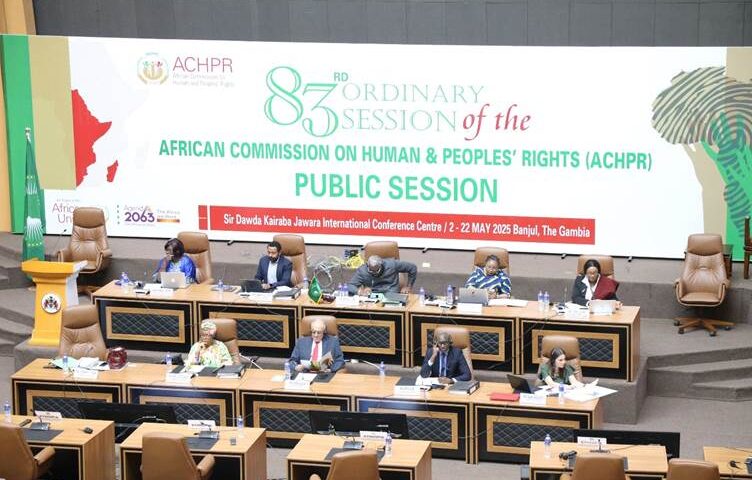Banjul, The Gambia — Violence against women and girls (VAWG) remains one of Africa’s most widespread human rights violations, threatening not only the safety and dignity of millions but also hindering gender equality, social cohesion, and economic growth across the continent. As part of a broader campaign to support the newly adopted African Union Convention on Ending Violence Against Women and Girls (AU CEVAWG), a panel discussion was held on 7 May 2025 at the ongoing 83rd Ordinary Session of the African Commission on Human and Peoples’ Rights (ACHPR), bringing together stakeholders from across the continent.
Speaking during the panel, Mrs. Hannah Forster, Executive Director of the African Centre for Democracy and Human Rights Studies (ACDHRS), delivered a compelling presentation calling for increased awareness, access, and collective advocacy around the AU Convention.
“And I just want to say that we’ve been involved because of this Convention and to share some of the strategies that we have been developing to ensure that we address its limitations,” Forster began, referencing her organization’s long-standing engagement with women’s rights advocacy. “Many times, we find out that it’s only some organizations that access the document. We want national actors to access it as well, and to use it to protect justice.”
Forster expressed concern that large segments of the population remain unaware of the Convention’s existence and purpose. “We have to ensure that we reach out to the different stakeholders and ensure that it’s not only a select group of citizens in Africa who have the chance to benefit from this. We must reach schools, communities, and grassroots institutions to advocate for it.”
She emphasized the role of civil society organizations in implementing the Convention and called for their capacity to be strengthened. “We have to ensure that, as organizations, we are in a position to do just that.”
Forster also highlighted the need to promote global awareness of best practices in advocacy, while recognizing challenges in coordination. “Many times, yes, we do advocate, but it’s a big challenge because there’s no centralized coordination. We would want the Chairperson of the African Union to set up a mechanism to coordinate advocacy, both at the continental and national levels.”
Her remarks further underscored the importance of engaging men and boys in the fight against VAWG. “I know we have HeForShe, but we need to enhance the promotion of such initiatives. Men and boys have a role to play.”
Discussing other strategic approaches, Forster mentioned targeting acceleration and knowledge-sharing efforts to promote equality. “We need to share what we know, promote equality, and ensure that perpetrators of violence face the full force of the law. We also need to encourage state institutions to incorporate the commitments required by this Convention.”
At the national level, she stressed the need to simplify legal language and fast-track legislative reforms that support gender equality. “We want to look at how to simplify and accelerate legal and legislative reform to enhance programmes that promote gender equality and ensure that women are protected.”
In a call to action for broader public engagement, she said, “National organizations are urged to use drama and individuals in society to facilitate inclusion. Communities must also be sensitized so they understand the content and purpose of this Convention.”
She also urged institutions and partners to work together in raising awareness, especially among human rights defenders. “We must encourage institutions to comply with their obligations. We need to litigate and, when necessary, link these cases to national courts and the African Commission or Court.”
Forster concluded by emphasizing that while much progress has been made, more must be done. “We’ve found that there’s still a long way to go before women and girls can enjoy their right to live free from violence. But we need to work collectively to ensure participation from all sectors. This is crucial if we are to achieve meaningful change.”
The African Union Convention on Ending Violence Against Women and Girls, adopted in February 2025 during the 38th AU Summit, seeks to fill the gaps left by existing instruments like the Maputo Protocol. It provides a harmonized legal and policy framework aimed at prevention, protection, accountability, and support for survivors.
The panel discussion served as a rallying call for AU Member States, civil society, and regional actors to intensify efforts toward the Convention’s ratification and effective implementation across Africa.


